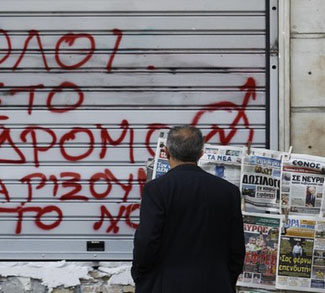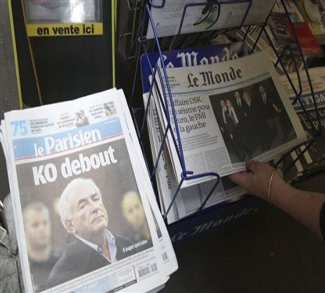In one reckless decision that will reverberate for generations, Greek Prime Minister Papandreou has doomed the European Union by exposing it to a potentially lethal dose of poisonous democracy.
The interlude between the announcement of the newest bailout deal and the Greek Prime Minister’s announcement was so brief that European leaders didn’t even get to enjoy a full sigh of relief. Midway through it, the ground fell out from under their feet, casting the EU and global markets once more into the abyss.
It is quite likely that the Greek people will vote down the latest bailout offer. This isn’t necessarily owing to whether or not this deal is fair or the best way to rehabilitate the Greek economy. Rather, a no vote will be the natural culmination of months and months of growing popular resentment towards a political process in Brussels that is totally detached from the Greek people. What’s more, the vote could quite easily become a referendum on the whole storied history of democratic indifference in Brussels- indifference that has created popular resentment since well before the Greek sovereign debt crisis came to dominate global headlines.
With so much at stake, why did Greek Prime Minister Papandreou decide on such a gamble? On this important question, expert opinion varies considerably. Some believe that he’s trying to insulate his political legacy, while others believe that he’s attempting to use high stakes to blackmail EU leaders into giving Greece a better deal. Fewer yet propose that he believes in the sanctity of democracy, and by extension maintains that whatever the Greek people choose is inherently the ‘right’ choice.
Whatever his reasons, the stakes could not be higher. A Greek ‘no’ vote would mean national bankruptcy and almost guarantee banishment from the EU; especially given the apocalyptic tone that German Chancellor Angela Merkel has adopted over the referendum. Looking at current opinion polls in Greece, with 44% of people viewing the bailout deal as ‘negative’ and 15 percent as ‘probably negative,’ conversations among top EU leaders have doubtlessly broached the possibility of banishing Greece from the EU and the need to plan for such a contingency.
It is interesting to note that the interconnectedness of the global economy is often cited as a reason for curtailing the democratic process in European Union decision making. Regardless of individual opinions on the importance of the EU, mostly everyone can agree that it is an institution which grew more out of the demands of global market than European voters.
In this latest stage of the ever-tenacious Greek debt crisis there is the potential for a truly historic event: a national disentangling from the tentacles of the global economy. If the vote comes up ‘no,’ we will see whether or not democracy truly is something that should be marginalized in the great project of building global capitalism. After all, maybe it’s true- maybe the Greek people really don’t know what’s best for them. Then again, maybe they do.




